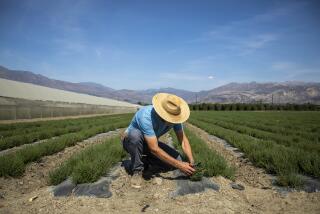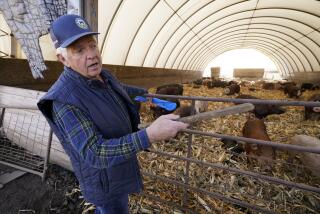‘Organic’ Marketing Ploy
- Share via
The organic food industry has gone mainstream, with revenue to match. Sales were more than $4 billion nationally in 2000, up from $173 million in 1980. Fertilizing the boom is consumers’ understandable eagerness to steer clear of the chemicals that are sprayed and dusted in increasing amounts on conventionally grown crops. In 1998, more than 50 million pounds of fungicides, herbicides, insecticides and soil fumigants were applied to California farm fields--3 million pounds more than in 1994.
Federal regulators, trying to bring some discipline to what “organic” means, proposed the first national standards for defining organic fruits, vegetables and meat in 1997. They are slated to go into effect this fall.
Now, before the system has even had a chance to work, Agriculture Secretary Ann M. Veneman is considering weakening the federal standards in a way that could reduce the term “organic” to marketing hooey.
Supported by a powerful delegation of Southern members of Congress, Baldwin, Ga.-based Fieldale Farms Corp. has asked Veneman to allow it and other companies to label their livestock organic, even if the animals eat nonorganic feeds and are thus exposed to a variety of chemicals in their diet.
Fieldale claims there isn’t enough organic feed produced in the U.S. to feed the 300,000 organic chickens it wants to turn out each week. That claim is hokum. As organic farm owners and large grain companies recently pointed out, there is more than enough pesticide-free grain available to meet Fieldale’s and other companies’ demands--just not at a price Fieldale wants to pay, since organic corn and soybeans cost two or three times more than conventionally produced grains.
Even if it were true that Fieldale couldn’t secure enough feed to expand production, the only honest course would be to cancel the expansion, not make a mockery of the term “organic.”
If Veneman grants the waiver for livestock, it would affect not just meat but eggs, milk and butter, as well as packaged products that contain dried versions of these foods.
National organic standards are largely based on ones crafted in the 1990s in California. Veneman, who served as California’s secretary of Agriculture in the late 1990s, supported strong organic-labeling standards back then. For example, in 1998, just after President Clinton’s Agriculture secretary, Dan Glickman, had proposed expanding the federal definition of organic to embrace genetic engineering and the use of recycled-sewage fertilizer on organic food, Veneman wrote a letter to Glickman, imploring him to “revise the rule to ensure a strong organic program.” Now that Veneman is in the hot seat, she shouldn’t repeat Glickman’s mistake.
More to Read
Inside the business of entertainment
The Wide Shot brings you news, analysis and insights on everything from streaming wars to production — and what it all means for the future.
You may occasionally receive promotional content from the Los Angeles Times.










